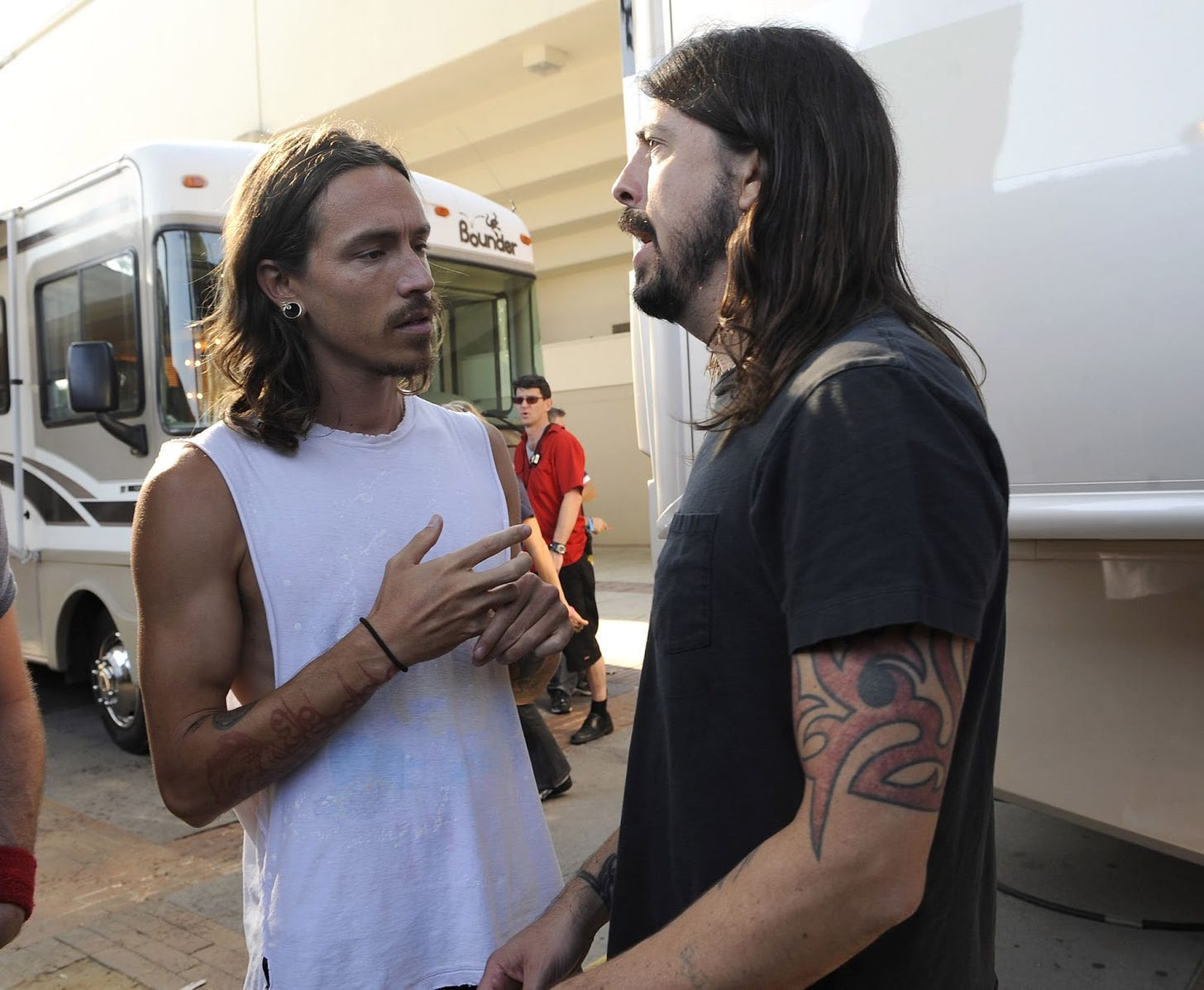Substack Reads: Brandon Boyd, Roxane Gay, and Bram Stoker
This week: Incubus’s Brandon Boyd looks back on a rock ‘n’ roll night to remember, and Roxane Gay takes us inside Paris’s most secretive bakery
Welcome to our fourth issue of Substack Reads, your weekend digest of the best writing from across Substack.
Regular readers will know that every week we aim to reintroduce you to some writers you know but may not have known were on Substack (Salman Rushdie? Chuck Palahniuk? Jeanette Winterson? Yes, all here on Substack) as well as introduce you to many you are perhaps not as familiar with but probably should be.
If you’re newish to Substack and in the mood to discover more great writing, podcasting, and art for yourself, however, you can now download our app, which makes discovery, not to mention reading and listening, a cinch.
Have a great weekend!
Read and listen to your favorite writers in one place
To get access to writing you love, plus listen to podcasts as you read, download Substack’s new iPhone and iPad app. No ads, no spam, just one dedicated space to enjoy your favorite writers on the go.
MUSIC
The unbearable lightness of being a rock star
Musician and lead singer of Incubus Brandon Boyd reminisces on the night he was asked to stand in for one of the biggest rock bands in the world
—Brandon Boyd in A Wink And A Nod

If memory serves, we were less than two hours from walking on stage to perform our track. We were perusing the backstage compound and doing our best to play it cool and not look too suspicious while we rubbed elbows with so many people we grew up watching and listening to, when our (then) manager called us into our trailer for some kind of emergency band meeting. Welp, we’d had a good run. Got our names on the playbill and in the commercials, but someone had figured us out for the interlopers and fraudsters we were and this was likely the moment they’d hand us our hats and quietly escort us out the back gate. Sigh…
Alas! No. We were being asked to perform another song after “I Can See for Miles.” Evidently the Foo Fighters were slated to play the classic track “I Can’t Explain,” among a couple of other classics, but as it was detailed to me, Dave was a little under the weather and needed to not take on so many songs. Great! Sure, we’d do that! One problem, though: we’d never played the song and didn’t know how it went. Of course we knew the song, but performing it in front of millions of people necessitates a more intimate understanding of it, right? You got this, guys, it’s only live TV.
FOOD
Flour. Water. Salt. Yeast.
Inside Poilâne, Paris’s most famous bakery—where nothing is left to chance
We saw how bread and the small butter cookies called Punitions and croissants and other delights are made via wood fire baking, which is a bit different than baking in a gas or electric oven. Poîlane has a 90-year-old wood-burning oven in which they make everything. It’s in the basement beneath the storefront, in a small, intensely but not unpleasantly hot kitchen at the foot of a steep, curving stone staircase. The stone floors are covered in a light sheen of flour. The ceiling is low. There are racks and wood for the fire, a work table, baskets for rising and proofing.
The tools they use today are the tools they used ninety years ago. The sourdough starter they use today is a descendant of the sourdough starter they used ninety years ago. Everywhere you look, in everything you taste, there are reminders of the importance of lineage, of history.
INFOWARS
The Opinion Pageant
How the pressure to have an opinion is creating a fake society
The transition from a world in which people interact in person to one in which people interact through text led to a shift in the way we define and judge people. With little visibility of a person’s deeds, we had to focus on their words. And so we began to define people primarily by their opinions.
Since opinions are now the basis of public interaction and identity, there’s a new pressure to have a point of view. If you don’t have a perspective on the thing everyone else is talking about, it becomes difficult to socialise—you basically don’t exist. The result is that people feel compelled to take a stance on everything.
The problem is, people don’t have the time or skill to adequately research every stance they’re prompted into taking. And so they’re forced to cut corners.
CURIOS
How Wordle became a cultural phenomenon
And why it owes its dues to the Cross Word
The Cross-Word was not an immediate success. In 1924, Richard L. Simon and M. Lincoln Schuster (who would later become THE Simon and Schuster) decided to start a company and publish compilations of crossword puzzles. Simon’s aunt was a fan from the New York Evening World, and the two men saw an opportunity. Concerned about failure, they published it under the label “Plaza Publishing.” The first run was only 3,600 copies, but The Cross Word Puzzle Book would go on to sell over 1 million copies. The puzzles were written by Margaret Farrar, a former secretary of Arthur Wynne. She was also the first to sort clues into unifying themes and came up with the horizontal and vertical clue divisions.
Simon and Schuster followed up their crossword puzzle best-sellers with other notable works by greats such as Hemingway, F. Scott Fitzgerald and Ursula Le Guin.
Simon and Schuster were possessed of a unique marketing savvy. They included a pencil with early editions to make it a complete gift. They also founded the Amateur Cross Word Puzzle League of America, which became quite popular and led to the first crossword puzzle tournaments. There was even a song in 1924 called “Cross-word Mamma, You Puzzle Me (But Papa’s Gonna Figure You Out).”
Popularity of the crossword led to their inclusion in every major newspaper… except one. In 1924, Wordle’s [now] new owner, the New York Times, referred to crosswords as a “sinful waste in the utterly futile finding of words the letters of which will fit into a prearranged pattern, more or less complex. This is not a game at all, and it hardly can be called a sport ... [solvers] get nothing out of it except a primitive form of mental exercise, and success or failure in any given attempt is equally irrelevant to mental development.” Ouch.
LITERATURE
The Dracula chronicles
Bram Stoker’s Dracula is an epistolary novel, made up of diaries, telegrams, newspaper clippings, and letters. Subscribers to Dracula Daily receive a daily newsletter with something that happened to the characters, in the same timeline it happened to them. Here, Lucy Westenra reveals she has a secret…
17, Chatham Street,
Wednesday.
My dearest Mina,—
I must say you tax me very unfairly with being a bad correspondent. I wrote to you twice since we parted, and your last letter was only your second. Besides, I have nothing to tell you. There is really nothing to interest you. Town is very pleasant just now, and we go a good deal to picture-galleries and for walks and rides in the park. As to the tall, curly-haired man, I suppose it was the one who was with me at the last Pop. Some one has evidently been telling tales. That was Mr. Holmwood. He often comes to see us, and he and mamma get on very well together; they have so many things to talk about in common. We met some time ago a man that would just do for you, if you were not already engaged to Jonathan. He is an excellent parti, being handsome, well off, and of good birth. He is a doctor and really clever. Just fancy! He is only nine-and-twenty, and he has an immense lunatic asylum all under his own care. Mr. Holmwood introduced him to me, and he called here to see us, and often comes now. I think he is one of the most resolute men I ever saw, and yet the most calm. He seems absolutely imperturbable. I can fancy what a wonderful power he must have over his patients. He has a curious habit of looking one straight in the face, as if trying to read one’s thoughts. He tries this on very much with me, but I flatter myself he has got a tough nut to crack. I know that from my glass. Do you ever try to read your own face? I do, and I can tell you it is not a bad study, and gives you more trouble than you can well fancy if you have never tried it. He says that I afford him a curious psychological study, and I humbly think I do. I do not, as you know, take sufficient interest in dress to be able to describe the new fashions. Dress is a bore. That is slang again, but never mind; Arthur says that every day. There, it is all out. Mina, we have told all our secrets to each other since we were children; we have slept together and eaten together, and laughed and cried together; and now, though I have spoken, I would like to speak more. Oh, Mina, couldn’t you guess? I love him. I am blushing as I write, for although I think he loves me, he has not told me so in words. But oh, Mina, I love him; I love him; I love him! There, that does me good. I wish I were with you, dear, sitting by the fire undressing, as we used to sit; and I would try to tell you what I feel. I do not know how I am writing this even to you. I am afraid to stop, or I should tear up the letter, and I don’t want to stop, for I do so want to tell you all. Let me hear from you at once, and tell me all that you think about it. Mina, I must stop. Good-night. Bless me in your prayers; and, Mina, pray for my happiness.
LUCY.
P.S.—I need not tell you this is a secret. Good-night again.
L.
LISTEN
Can Jay Powell bring us to a ‘soft-ish’ landing?
In his weekly podcast series, Josh Barro explores the ideas behind what is happening in politics, economics, and culture by looking back at historical precedents. This week he is joined by economist Jason Furman to ask: Can a freefalling economy really save itself?

Continue listening and reading
Substack Reads is a weekly roundup of writing, ideas, art, and audio from the world of Substack. Posts are recommended by staff and readers, and curated and edited from Substack’s U.K. outpost with writer Hannah Ray and editor Farrah Storr.
Got a Substack post to recommend? Tell us about it in the comments.















Great picks for this week. I just checked out Brandon’s Substack and he’s an amazing writer. He also has a recently released solo album too! Looking forward to seeing what’s next.
I love these. This is such a bonus-extra for my subscription to Lucian’s articles. Thank you for these. I will treasure them.